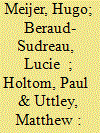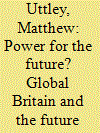|
|
|
Sort Order |
|
|
|
Items / Page
|
|
|
|
|
|
|
| Srl | Item |
| 1 |
ID:
160638


|
|
|
|
|
| Summary/Abstract |
The rise of China has been fuelled by a massive military modernisation programme relying, in large part, on the acquisition of foreign military equipment. The question of how the world’s major powers define their arms transfer policies towards China is therefore crucially important. This article makes two original contributions. First, drawing on neoclassical realism, it proposes an explanatory framework integrating international and domestic factors to explain variations in major powers’ arms transfers. Second, based on a large body of elite interviews and diplomatic cables, it offers the first comprehensive comparison of American, British, French and Russian arms transfer policies towards China since the end of the Cold War.
|
|
|
|
|
|
|
|
|
|
|
|
|
|
|
|
| 2 |
ID:
053863


|
|
|
|
|
| Publication |
Harlow, Longman, 2001.
|
| Description |
x, 158p.
|
| Standard Number |
058230377X
|
|
|
|
|
|
|
|
|
|
|
|
Copies: C:1/I:0,R:0,Q:0
Circulation
| Accession# | Call# | Current Location | Status | Policy | Location |
| 044724 | 044724/CRO 044724 | Main | On Shelf | General | |
|
|
|
|
| 3 |
ID:
167123


|
|
|
|
|
| Summary/Abstract |
This article explores how the United Kingdom Ministry of Defence's (MoD) institutional vision of the potential future character of conflict is reflected in current defence policy decision-making and future force development planning. On the face of it, institutional arrangements in the MoD suggest that the results of ‘horizon-scanning’ and ‘futures’ analysis guide long-term defence planning in the design and development of the UK's future military roles and force structure. Our analysis points to the opposite. It suggests that it is the unchallenged assumption that the UK will remain a ‘Tier One’ defence power capable of deploying military power on a global scale and the MoD's long-term planning cycle that shape long-range forecasts of the future operating environment, rather than the other way round. Our explanation for this inversion is derived from the ‘New Institutionalism’ approach to public policy analysis. In taking this approach, we suggest that the outcomes of UK defence policy formation are strongly influenced by path dependency in the form of baked-in institutional ideas about the ‘appropriate’ role of Britain as a military power (‘what should be done’), along with historical capability investments underpinning UK defence that are costly to reverse (‘what can be changed’). By extension, we argue that if these embedded path dependencies explain the development of previous and current UK defence policy, then it should come as no surprise that the current ends, ways and means in UK defence are projected forward in the MoD's institutional view of potential future operating environments, resulting in limited change within established paths.
|
|
|
|
|
|
|
|
|
|
|
|
|
|
|
|
|
|
|
|
|